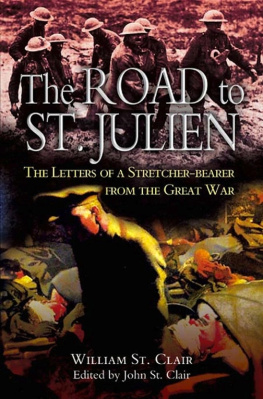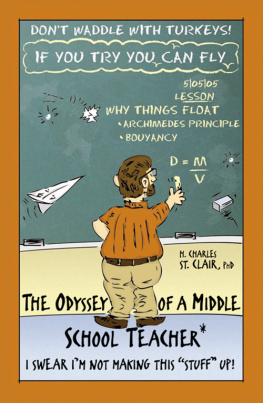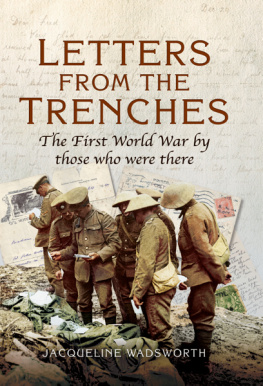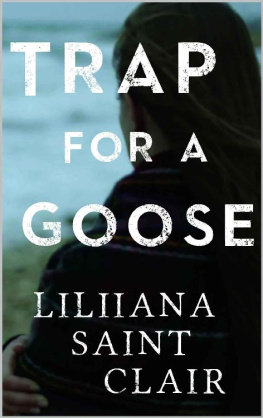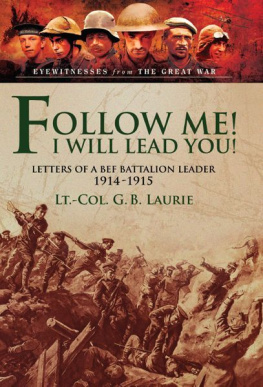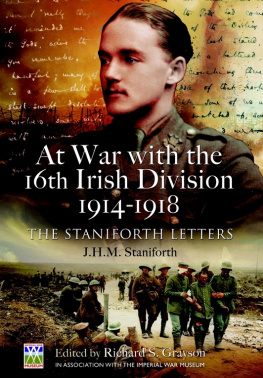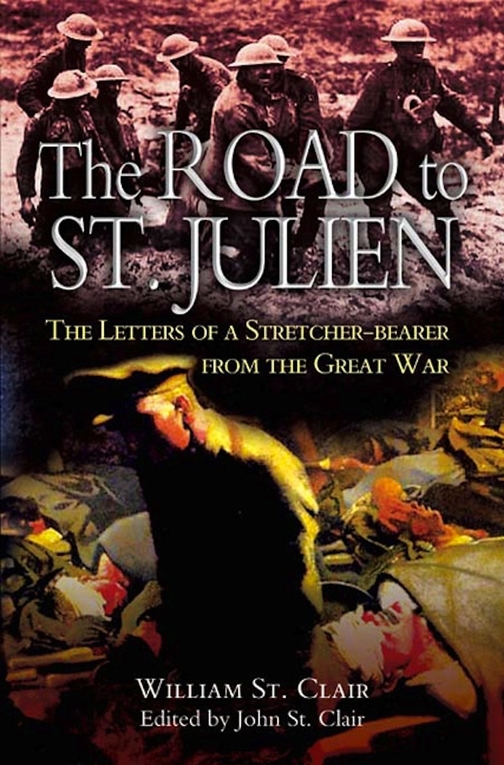Acknowledgements
I have received a great deal of encouragement and assistance in editing the letters, diaries and plays of my uncle, William St Clair. All the encouragement and assistance has been much appreciated, and I am sorry that I cannot thank everyone with a proper mention.
My first thanks are to William St Clairs daughter-in- law, Pat St Clair, and her late husband, Norman St Clair, who saved William St Clairs papers, pictures and photographs. Without these documents and Pats wealth of personal recollections of her father-in-law, which she has shared with me, this book could not have been attempted. I am profoundly grateful to her. To be allowed to edit such a unique archive is an exceptional privilege.
Secondly, I would like to thank my brother, William, to whom William St Clairs papers were entrusted over thirty years ago, and who very kindly suggested that I might like to edit them. I am also grateful to him for his unstinting help and advice at all stages of the preparation of this book.
I am also very grateful to John and Patience Bagenal for giving me free access to the papers of the late Hope Bagenal DCM. It has been one of the pleasures of writing this book to have got to know them and now to count them as friends.
For particular encouragement and help from further afield, I must thank St Johns College, Johannesburg, for giving me access to the papers of their former headmaster, the late Reverend Captain Eustace Hill MC, and especially for allowing me to publish for the first time the photograph of Eustace Hill at Delville Wood in 1919.
As regards the pictures and photographs of the war in the book, all were drawn by William St Clair or were selected by him for inclusion in a family album as authentic to the subject matter. In helping me to choose what pictures and photographs to include in the book and for encouragement and help, I am most grateful to my friend Roger Tarr of Edinburgh University History of Art Department. Immediately he saw Willies coloured pictures, he appreciated their importance as uniquely evocative of the events portrayed, especially in showing that our imagery of the Great War, from old newsreels, of a war fought in black and white, is misleading. I was also fortunate that Rogers colleague, Norma Henderson, so expertly photographed all the pictures, photographs and maps for inclusion in the book.
Thanks are also owed to Kenneth Shirlaw for help and encouragement and correcting any military errors, and to my cousin, William Roy St Clair, for helping me with the religious background of William St Clairs family, and to my brother, David, for encouragement and sharing recollections of our uncle which I had forgotten or misremembered.
I would also like to thank Brigadier Wilson and all the editorial staff at Pen and Sword. Their help, advice and suggestions have been greatly appreciated and have added much to the quality of the book.
Finally thanks are due to my wife, Emma, and my children, David and Andrew, for all their loving support, while I was engaged on the book.
Appendix
The Prayer , which draws on a real incident described to Jane in a letter, In 1931 The Prayer was performed at the 27 Field Ambulance Veterans Association Annual Reunion. One veteran later wrote to Willie that he could almost feel the smell of the blood and dirt from the trenches as he watched.
Epilogue
In terms of the Armistice the Germans were to withdraw all their forces over the Rhine and allied troops were to advance and occupy the German west bank of the Rhine. They were also to cross the Rhine and occupy bridgeheads at Coblenz, Mainz and Cologne. The British Army was to occupy the Cologne bridgehead. It was decided in the days after the Armistice that the 9th (Scottish) Division would have the honour of being the only New Army division to march via Waterloo to the Rhine and establish the British bridgehead. Willies 9th Division began the march to the Rhine on 14 November 1918. They arrived on 9 and 10 December and crossed by the Muhlheim Bridge of Boats at Cologne on 13 December 1918, with bagpipes playing All the blue bonnets are over the border the same tune that the most famous bagpiper of the war, Piper Laidlaw VC of the KOSB had played marching up and down the parapet at Loos.
Willie served in the British Army of Occupation of the Rhineland until his discharge in May 1919. The Army of Occupation stayed until 1929. Apart from the desperation to get home, life was easy with all sorts of entertainments laid on for the soldiers, including in his case a visit to the Cologne Opera to see Wagners The Valkyrie . He was deeply impressed with this aspect of German culture and wrote to Jane, It is quite beyond my powers of description to tell you how wonderful it was. I have never heard such beautiful music and singing, and the whole thing was superb and whacks home productions hollow. I will enclose you my Guide, which you must keep for me. The piece was from the Nibelungs Ring by Wagner.
On a grimmer note, Willie was an eye-witness to the starvation of the German population which was inflicted on them as a deliberate act of policy by the Allies in order to force them to accept the peace terms a policy which, according to Winston Churchill threw away the moral victory of the war and helped pave the way for Hitler. The starvation was caused by the continuation of the wartime Naval Blockade, bringing death to hundreds of thousands of Germans. On 3 March 1919 Winston Churchill, who by then was Secretary of State for War, told Parliament that his officers had reported that Germany was on the verge of complete social and national collapse through hunger and malnutrition. Germany was like a besieged town. Lloyd George told the Allied Conference at Spa in March that the British troops were indignant about the Allied refusal to revictual Germany and that General Plumer had advised him that he could not be responsible for his troops if children were allowed to wander about the streets half-starved.
Willie wrote in his diary, There is no doubt whatever but that the German is suffering from the Blockade. I have seen kids wait for hours on the off-chance of getting from a soldier what he usually throws in the swill, and also men have been forced to beg for permission to lift what we would give to pigs. He talked of restaurants accepting scraps on the plates as payment for cooking rations because food was unobtainable. Against the blind working of the official policy he mentioned individual acts of kindness to the Germans by the British soldiers, The Iron Cross I have is a real one given to me by the German who won it while fighting against our own Div at Kemmel Hill April 1918. I gave him a small luxury for his sick mother, and protested when he offered me his medal in payment. The medal is useless to me, he said, Germany is finished.
The Prayer by W. St Clair
CHARACTERS
| Corporal Peake RAMC | An Englishman. |
| Private Jeffrey RAMC | A young Soldier. |
| Private Jock Shaw, Argylls. | A Scotchman. |
| Captain Linn, RAMC | A Doctor. |
| Private Dick MacAlister, RAMC | A Scotchman |
| Padre Hall. | Of the South African Brigade. |
| Jerry. | A German Soldier. |
| 1st Stretcher-Bearer. | A Cockney. |
| 2nd Stretcher-Bearer. |
THE SCENE
The Scene is the interior of a captured German pillbox at St Julien, France, during a lull in the battle of Passchendaele, October 1917. It is being used as an Aid Post by a Field Ambulance of the RAMC attached to a Scottish Division. There is an opening back right, opening to battle country, but during the action of the play this opening is covered with an Army blanket. The door is built into the wall to show the thickness of the pillbox with the blanket on the inside. Inside this opening going right is another section of the pillbox used by officers. Down left is a small collapsible table which is covered with white gauze. On it there are three small enamelled bowls, one holding gauze dressings, one cotton wool swabs, the other instruments, forceps etc. A small pile of bandages, a roll of cotton wool, a bottle labelled Eusol, a primus stove, a small sterilizer, a hurricane lamp, safety pins etc. An enamelled pail and small basin underneath table, an ammunition box above table. Back centre, a wooden erection to hold three or four stretcher cases.

